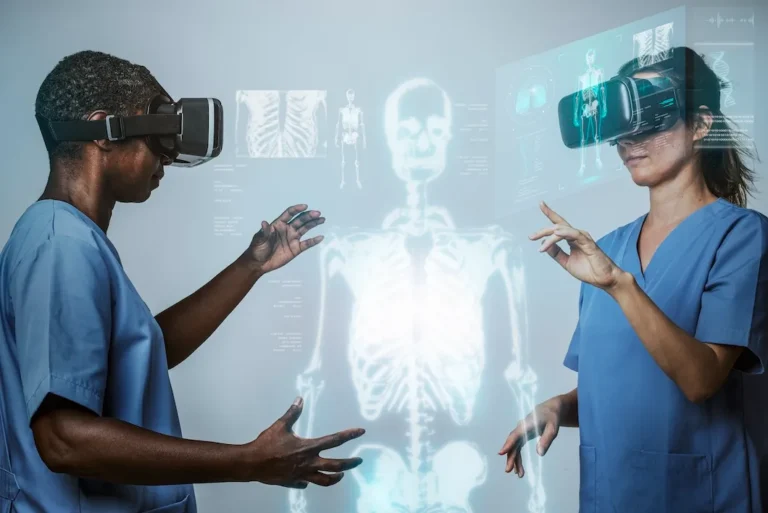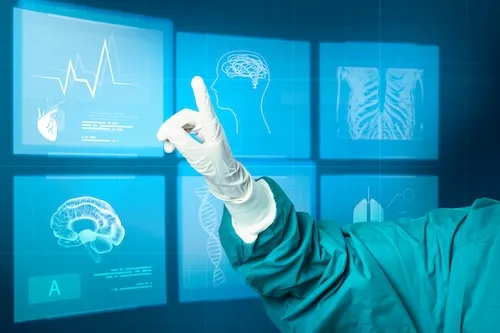Imagine a world where your smartphone not only tracks your steps but also your mood.
Where an AI-powered chatbot can pop up and provide comfort during sleepless nights.
Where your mental health treatment is tailored to your unique genetic makeup.
This isn’t science fiction—it’s the dawning reality of mental healthcare in the age of artificial intelligence and learning models.
Global mental health challenges are reaching unprecedented levels – with many individuals looking for new ways to find hope beyond the noise. However some companies and medical teams are looking to connect the devices we use every day with advances in AI to turn our technology into a mental health tool.
Our team at AlignUs understands the critical intersection of technology, wellness, and social impact. As we continue to build our mental health platform, we’re exploring how AI is reshaping the landscape of mental health care, offering both promise and pause for reflection.
The Current State of Mental Healthcare
Before we take a look at how AI is impacting healthcare, let’s take a moment to consider the current state of mental healthcare.
Despite significant advances in understanding and treating mental health conditions, we face a global crisis. The World Health Organization reports that nearly 1 billion people worldwide live with a mental disorder, yet there’s a staggering shortage of mental health professionals to meet this growing need.
This gap is where technology – particularly AI – can help bridge the gap between those in need and the limited resources available.
Just as AlignUs aims to create a platform for social impact that combines charitable giving with personal growth and wellness, AI is bridging the divide between limited resources and overwhelming demand in mental health care.
AI in Mental Health Diagnostics
One of the most promising applications of AI in mental health is in the realm of diagnostics.
Traditional mental health assessments often rely on subjective observations and self-reporting. This can lead to a variety of issues, from biased diagnoses to long wait times for appointments with specialists.
On the other hand, AI can analyze vast amounts of data and make objective assessments based on patterns and trends. This can lead to more accurate and timely diagnoses, allowing individuals to receive treatment sooner and potentially prevent the development of more serious mental health issues.
- Pattern Recognition: Machine learning algorithms can analyze vast amounts of data—from speech patterns and facial expressions to social media activity—to identify potential indicators of mental health conditions. This can lead to earlier interventions and more accurate diagnoses.
- Predictive Analytics: By processing historical data and current symptoms, AI can predict the likelihood of certain mental health episodes, allowing for preemptive care strategies.
- Objective Measurement: AI tools can provide more objective measurements of mental states, reducing the potential for human bias in diagnoses.
- Accessibility: AI-driven initial assessments can be conducted remotely, making mental health screenings more accessible to those in underserved areas.
As we at AlignUs work to build healthy lifestyle communities through our platform, we recognize the potential of these AI diagnostic tools to complement human expertise, offering a more comprehensive picture of an individual’s mental health.
AI-Powered Treatment Approaches
Beyond diagnostics, AI is revolutionizing treatment approaches in mental healthcare. Think of it as a virtual therapist, available 24/7 to provide personalized support and guidance.
One example is chatbots, which use natural language processing and machine learning algorithms to converse with users and offer therapeutic interventions. These chatbots can provide immediate support in moments of crisis or serve as ongoing companions for those seeking therapy.
AI-powered virtual reality (VR) therapy is effective in treating various mental health conditions, such as anxiety disorders and post-traumatic stress disorder. VR therapy allows individuals to confront their fears and develop coping mechanisms by creating realistic simulations of triggering situations or environments.
These AI-driven approaches align with AlignUs’ mission to inspire wellness through connection and compassion. By integrating technology with mental health care, we’re moving towards a future where support is always within reach.
Mental Health Platforms and AI Integration
The rise of mental health platforms has been a game-changer in making support more accessible and user-friendly.
Much like AlignUs, these platforms are increasingly incorporating AI to enhance their offerings by analyzing user data and providing personalized recommendations. The result is a more efficient and effective way to support individuals in their mental health journey.
Here are just a few of the current – and potential – ways that AI integration is transforming mental health and empowering individuals to take control of their well-being.
- Mood Tracking: AI algorithms can analyze user-inputted data and passive smartphone metrics to track mood patterns over time, providing insights that users and their healthcare providers can act upon.
- Personalized Content Delivery: Mental health platforms use AI to curate and deliver content tailored to each user’s needs, from guided meditations to educational resources on specific mental health topics.
- Crisis Detection: Advanced AI systems can detect signs of potential crisis situations, such as suicidal ideation, and promptly alert human moderators or emergency services when necessary.
- Community Matching: AI can help connect users with similar experiences or challenges, fostering peer support within healthy lifestyle communities.
We recognize the power of community in promoting mental wellness. Our platform aims to create a supportive environment where individuals can connect, share experiences, and grow together, all enhanced by the thoughtful integration of AI technologies.
The Role of Health and Wellness Podcasts in AI-Assisted Mental Health
Health and wellness podcasts have become a popular medium for disseminating mental health information and strategies. The integration of AI is taking these podcasts to new heights.
For instance, AI algorithms can analyze listening habits and feedback to recommend relevant podcast episodes, ensuring users receive content most beneficial to their mental health journey. This can then lead to a more personalized and effective listening experience.
Plus, many health and wellness podcasts now incorporate AI-assisted tools such as guided meditations or breathing exercises into their episodes. These interactive elements can help listeners actively engage with the podcast content and apply it in real-life situations.
Accessibility is being innovated as well. AI technologies have the potential to enhance the accessibility of mental health information through podcasts. By transcribing podcast episodes into text format, individuals who may prefer reading over listening can still access valuable insights and tips for improving mental well-being.
At AlignUs, we understand the impact of audio content on mental well-being. Our own podcast series, which explores personal growth and mental well-being, could potentially benefit from these AI enhancements to provide even more value to our listeners.
Building Healthy Lifestyle Communities with AI Support
The concept of healthy lifestyle communities is central to platforms like AlignUs, and AI is playing an increasingly important role in nurturing these digital spaces. So, what does this type of AI support look like?
Behavioral Insights
AI can analyze community interactions to identify trends, helping platform managers understand what types of content and activities most effectively promote mental health and engagement.
Automated Moderation
AI-powered moderation tools can help maintain a safe and supportive environment by detecting and flagging inappropriate content or potential conflicts.
Personalized Challenges
Within fitness and wellness communities, AI can generate personalized challenges that align with individual goals and preferences, fostering motivation and a sense of accomplishment. Once a challenge is completed, AI can provide recommendations for new goals or activities to maintain engagement.
Resource Allocation
For platforms that integrate charitable giving, like AlignUs, AI can help optimize the allocation of resources by analyzing the impact of different initiatives on community well-being.
These AI-driven features align perfectly with AlignUs’ mission to create a platform where giving is fun, easy, and rewarding. By leveraging technology to enhance community experiences, we’re fostering an environment where personal growth and social impact go hand in hand.
What Are The Potential Positive Impacts of AI on Mental Health?
The integration of AI in mental healthcare holds immense promise. AI-powered tools can provide basic mental health support to individuals who might otherwise lack access to care, especially in underserved areas.
By detecting subtle changes in behavior or mood, AI can also facilitate early intervention, potentially preventing the escalation of mental health issues. And with 24/7 support, AI tools and tech can provide a safety net for individuals in moments of crisis.
Perhaps most important is how data can be protected and stigmas overcome. The privacy and anonymity offered by AI-powered mental health tools may encourage more people to seek help, reducing the stigma associated with mental health care.
Are There Ethical Considerations with AI?
While the potential benefits of AI in mental healthcare are significant, it’s crucial to consider the potential drawbacks and ethical implications.
Collecting and analyzing sensitive mental health data raises important privacy issues. There’s a need for robust data protection measures to prevent misuse or unauthorized access.
Beyond security, there’s a personal factor. AI, no matter how advanced, cannot fully replicate a human therapist’s empathy and nuanced understanding. Over-reliance on AI could potentially lead to a depersonalization of mental health care.
Similarly, there’s a risk of algorithmic bias. AI systems are only as unbiased as the data they’re trained on. There’s a risk of perpetuating or exacerbating existing biases in mental health diagnostics and treatment.
When AI is involved in mental health decisions, questions arise about who is responsible if something goes wrong – the AI developers, the healthcare providers, or someone else?
At AlignUs, we’re acutely aware of these ethical considerations. As we develop our platform, we’re committed to implementing AI in a way that enhances rather than replaces human connection and that prioritizes user privacy and well-being.
The Future of AI in Mental Healthcare
Looking ahead, the integration of AI in mental healthcare will only continue to grow. We expect to see a variety of applications emerge, including:
- Predictive Prevention: Advanced AI models may be able to predict mental health crises before they occur based on a combination of biological, psychological, and social factors.
- Brain-Computer Interfaces: Emerging technologies that allow direct communication between the brain and external devices could revolutionize how we understand and treat mental health conditions.
- Holistic Health Integration: AI could help create more comprehensive health profiles, integrating mental health data with physical health metrics to provide truly holistic care.
- Global Mental Health Initiatives: AI-powered platforms could facilitate global mental health initiatives, breaking down geographical and language barriers to care.
- Personalized Mental Fitness: Just as AlignUs aims to gamify charitable giving and personal growth, future AI applications might turn mental health maintenance into an engaging, personalized “mental fitness” regimen.
Join Us In The Future of Healthcare & AI
The intersection of AI and mental health represents a frontier brimming with potential. From enhancing diagnostics and treatment to fostering supportive, healthy lifestyle communities, AI is reshaping how we approach mental wellness. Platforms like AlignUs are at the forefront of this revolution, integrating technology with human-centered approaches to create meaningful impact.
The future of mental healthcare isn’t about replacing human connection with artificial intelligence.
Rather, it’s about leveraging AI to enhance our capacity for empathy, understanding, and support. It’s about creating digital spaces where technology amplifies our human potential for growth and giving.
AlignUs Is Preparing For an AI-Powered Future
As AlignUs prepares to launch its mobile application in Fall 2024, we’re excited to be part of this transformative journey. We envision a world where mental health platforms, powered by AI but rooted in human compassion, can make a real difference in people’s lives.
We believe in a world where health and wellness podcasts offer not just information but personalized guidance. Where healthy lifestyle communities thrive, supported by intelligent systems that foster connection and growth.
In this AI-enhanced future of mental healthcare, the possibilities are as limitless as the human capacity for resilience and compassion. As we step into this new era, let’s embrace the potential of AI while keeping our focus firmly on what matters most – the well-being and flourishing of every individual in our global community.




